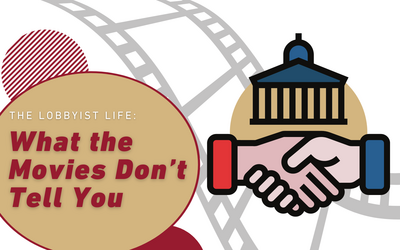
Most of us have seen lobbyists… on TV and in movies.
Annette Benning played one in “The American President” and Aaron Eckhart played one in “Thank You for Smoking.” They are attractive, smooth-talking persuaders. Eckhart’s lobbyist is cynical and manipulative, Benning’s is a passionate advocate. They are both the targets of criticism, and the job title itself has become a dirty word. Often, the more successful a lobbyist is, the more contempt people have for them — especially lobbyists who are working the other side of the issue!
But why are they there at all? According to the U.S. House of Representatives’ history blog:
Buttonholing Members of Congress to tell them how you think they should vote—that’s as old as the republic itself. But calling it “lobbying”? Where does that come from? … [The] political use of the term “lobby” began in 1810s, in the statehouses of the northeastern United States. In 1817, one newspaper referred to a William Irving as a “lobby member” (as opposed to an elected member) of the New York legislature. It was the first known use of the term in print.
Before there were social media influencers, there were just… influencers.
What is a Lobbyist?
For the last 200 years, lobbyists have essentially been part government. But why? In broad strokes, it’s because lobbyists are trusted experts in law and policy.
Elected officials make important decisions on a wide variety of issues every day. In both Washington, D.C. and state capitols across America, our representatives juggle their service on multiple legislative committees as diverse as transportation, healthcare and the environment. Even if representatives are not on a committee, they will eventually vote on bills from all those areas, and many more. Representatives cannot be expected to come to every public hearing with the knowledge needed to make informed decisions on every topic, so they rely on trustworthy stakeholders to help them understand all sides of the issue.
Legislative committees generally have nonpartisan staff members who are experts in those areas, and they are crucial to writing good policy and supporting all elected officials, regardless of political affiliation. They provide essential expertise and are crucial to the creation and passage of good laws.
Lobbyists are also experts in their policy areas, and can tell a lawmaker how a bill, a paragraph, a phrase, and even certain punctuation will affect the jobs and lives of people at home. All laws are ultimately about people, and lobbyists are essential to lawmakers in understanding how people will be impacted by their decisions.
Many lobbyists work for decades in their capitols, accumulating a deep knowledge of their industry, law, policy and politics. The importance of trust is often overlooked in Hollywood caricatures, but if a lobbyist becomes known as a liar, they have a hard time getting meetings. And if you can’t meet, you can’t inform or influence.
Lobbyists are paid advocates, of course, and being forthcoming about that is part of the trust-based relationship. This is similar to why social media influencers disclose paid partnerships: It’s cool to get paid to advocate for products you like, but not OK to lie about it.
The Real Secret Behind Lobbying
The most important thing for patients to know is that nonprofits and their lobbyists are essential allies in ensuring that new laws truly benefit patients.
Lobbyists, by definition, are good advocates. But they’ll admit that the best advocate is someone with lived experience. You certainly don’t have to be a professional lobbyist to have influence.
“Don’t give me all this data!” one lawmaker said to a lobbyist. “Give me a story.”
If you get the opportunity to testify at a legislative hearing, for example, it will probably be a lobbyist who helps you get a seat at the table. They’ll also prepare you to speak, help you answer questions, and tell you where to find the cheapest parking.
Get Involved!
The Chronic Disease Coalition (CDC) is committed to advocating for patients and helping them advocate for themselves. Lobbyists are our experts on the ground, and we’re excited to introduce you to a panel of lobbyists who work every day on issues we all care about. They’re going to share their experiences and tell you the real truth of the matter:
In healthcare policy, there are few things as powerful as a patient story. That’s why the CDC works to educate and activate chronic disease patients all over the country. We want to make you as effective as possible, and that means giving you the tools and knowledge to get your voice heard.
Register for our free session today to learn more about the important, behind the scenes, role of lobbyists in chronic disease policy.